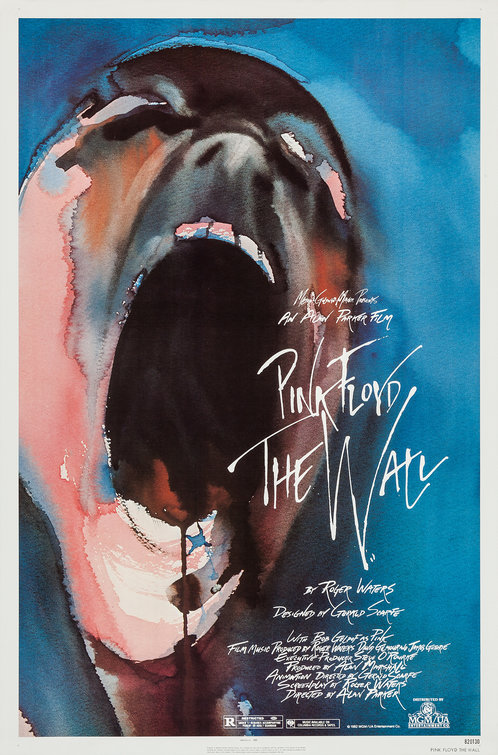Pink
Floyd's The Wall is
one of the greatest musical albums of all time. It is in my opinion
Pink Floyd's best album (some say it's Dark Side of the
Moon, but they're wrong). I love
this album because each and every song is excellent by itself, but
together they tell the very interesting story of Roger Waters'
troubled life, and the alienation he felt upon becoming famous. The
Wall is one of just a handful of
rock operas adapted to film. The only other that I am aware of is The
Who's Tommy, still
waiting on that The Rise and Fall of Ziggy Stardust and the
Spiders from Mars movie, Mr.
Bowie. The movie version of The Wall
is just as much of a triumph as the album is. It visualizes the music
so well with a cool blend of live action and animation, and the
visualization helps to make clear the messages of the music from the
album, which can get lost behind rhythms and melodies. While there
are handful of artistic indulgences, the film is very interesting to
watch, especially if you're a fan of Pink Floyd's music.
The
story mirrors the same story contained in the musical album. It tells
the story of Pink Floyd, here a actual person, rather than the band.
Pink is a stand in for Roger Waters, played by the Boomtown Rats
frontman, Bob Geldof. Waters was originally slated to play Pink, but
after testing poorly with audiences, he was replaced by the New Wave
singer. Like Waters, Pink's father was killed in World War II, an
event which caused his mother to become sheltering and
overprotective. In school, Pink is berated for writing poetry, and
the film makes a strong point saying that schools suppress
individuality, and turn children into mindless drones meant for
military service. Pink eventually marries a beautiful woman, but
while he is away on tour, she cheats on him with a political
activist. This causes Pink to slip into depression and he starts to
use drugs and groupies. After one concert he takes a groupie back to
his hotel room but in his inebriation he trashes the room and
frightens the girl. After the girl flees, he slouches in front of the
television and passes out. He is saved by his manager (Bob Hoskins!)
and as he is revived he imagines himself as a neo-nazi and his
concert is a neo-nazi rally. He then passes judgement on himself (The
Trial, my favorite song from the album, shown here disturbing as all
hell). In the judgement Pink is told to tear down the wall, a
metaphor for the alienation of celebrity.
The
music used is center stage in this movie. Unlike other rock operas,
there is almost no spoken dialogue whatsoever, instead the story is
told entirely though the songs and their accompanying visuals. Geldof
is believable in the lead role, I honestly thought he was Roger
Waters until the ending credits rolled. The animation sequences by
Gerald Scarfe are trippy, one in particular shows Pink's enmity
towards his ex-wife with a sequence of two flowers, one so
gynecological it would make Georgia O'Keefe blush. The flowers have
sex, and the female flower turns into a fanged beast. While there are
many messages in this film, anti-war and anti-instiutionalism, the
main focus is on Pink's psychological issues. The entire film is told
in sequences flashing backwards and forwards, centering on an adult
Pink in a drug induced stupor in his hotel room. This suggests that
the other scenes are Pink remembering his past and reflecting on them
through various hallucinations, such that the film more or less takes
place in real time. If you love Pink Floyd's music, especially The
Wall, then this movie is a
must-see.


No comments:
Post a Comment